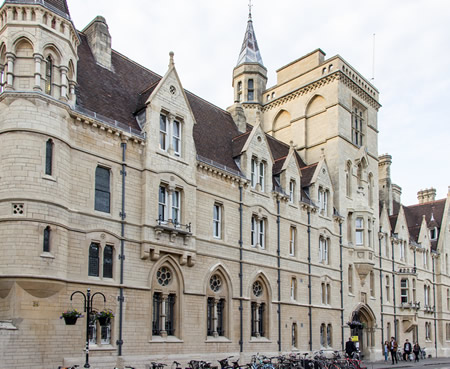« India's University Grants Commission updates the Press on the Latest Position on Terminal Semester(s)/Final Year Examinations by the Universities. | Main | The Ducati Team returns to action in Jerez de la Frontera for the opening Grand Prix of the 2020 MotoGP World Championship. »
July 20, 2020
Oxford University coronavirus vaccine produces a robust immune response, reveals a new study.

Photo: Balliol College, University of Oxford, Oxford, England. Image Credit: Billy Wilson.
Oxford, July 20, 2020 — A team of scientists at Oxford University’s Jenner Institute and Oxford Vaccine Group has taken the next step towards discovering a safe, effective, and accessible vaccine against coronavirus.
The results published in The Lancet confirmed a single dose of AZD1222 resulted in a four-fold increase in antibodies to the SARS-CoV-2 virus spike protein in 95% of participants one month after injection. The results indicate no early safety concerns. The vaccine induces robust immune responses in both parts of the immune system.
The vaccine provoked a T cell response within 14 days of vaccination (white blood cells that can attack cells infected with the SARS-CoV-2 virus), and an antibody response within 28 days. Antibodies can neutralize the illness so that it cannot infect cells when initially contracted.
During the study, participants who received the vaccine had detectable neutralizing antibodies, which have been suggested by researchers as necessary for protection, and these responses were most potent after a booster dose, with 100% of participants’ blood having neutralizing activity against the coronavirus. The next step in studying the vaccine is to confirm that it can effectively protect against SARS-CoV-2 infection.
Professor Andrew Pollard, Chief investigator of the Oxford Vaccine Trial at Oxford University, said: “The interim Phases I and II data for our coronavirus vaccine shows that the vaccine did not lead to any unexpected reactions. It had a safety profile similar to previous vaccines of this type. The immune responses observed following vaccination are in line with what we expect will be associated with protection against the SARS-CoV-2 virus. However, we must continue with our rigorous clinical trial program to confirm this. We saw the strongest immune response in participants who received two doses of the vaccine, indicating that this might be a good strategy for vaccination.”
During the Phases I and II trials, Oxford evaluated the vaccine in more than 1,000 healthy adult volunteers aged between 18 and 55 years in a randomized controlled trial. A subset of these volunteers (10 people) received two doses of the vaccine. Between April 23, 2020, and May 21, 2020, 1077 volunteers, received the vaccine ChAdOx1 nCoV-19 or a placebo MenACWY vaccine. There were no serious adverse health events related to ChAdOx1 nCoV-19.
These encouraging results support further evaluation of this candidate vaccine in our ongoing large-scale Phase III program, which is still needed to assess the vaccine’s ability to protect people from COVID-19, the University stated.
The University of Oxford is working with the UK-based global biopharmaceutical company AstraZeneca for further development, large-scale manufacture, and potential distribution of the Covid-19 vaccine, with plans for clinical development and production of the Oxford vaccine progressing globally. The project has been further spurred by £84 million of Government funding to help accelerate the vaccine’s growth.
“We are encouraged by the Phases I and II interim data showing AZD1222 was capable of generating a rapid antibody and T-cell response against SARS-CoV-2. While there is more work to be done, today’s data increases our confidence that the vaccine will work. It allows us to continue our plans to manufacture the vaccine at scale for broad and equitable access around the world,” said Mene Pangalos, Executive Vice President of BioPharmaceuticals Research and Development at AstraZeneca.
Oxford and AstraZeneca are collaborating with clinical partners worldwide as part of a global clinical program for the trial of the Oxford vaccine. The comprehensive plan includes a Phase III trial in the US enrolling 30,000 patients, a pediatric study, and Phase III trials in low-to-middle income countries like Brazil and South Africa.
AstraZeneca remains committed to fulfilling its commitment for broad and equitable access to the vaccine, should late-stage clinical trials prove successful. So far, we have promised to supply more than 2 billion doses of the vaccine to the UK, US, Europe’s Inclusive Vaccines Alliance (IVA), the Coalition for Epidemic Preparedness (CEPI), Gavi the Vaccine Alliance and Serum Institute of India.
Business Secretary Alok Sharma said: “Today’s results are extremely encouraging, taking us one step closer to finding a successful vaccine to protect millions in the UK and worldwide. Backed by £84 million Government investment for the vaccine’s development and manufacture, the agility and speed with which the University of Oxford has worked is outstanding. I am very proud of what they have achieved so far.”
Kate Bingham, Chair of the UK’s Vaccine Taskforce, said: “The UK is fortunate to have such outstanding academic innovators working alongside the highly experienced global team at AstraZeneca. This partnership is working at exceptional speed to demonstrate the safety and clinical effectiveness of the vaccine in protecting people against COVID-19 infection.”
Source: The University of Oxford
|GlobalGiants.Com|
— The editor is a holder of an Oxford Alumni Card.







Edited & Posted by the Editor | 1:44 PM | Link to this Post







